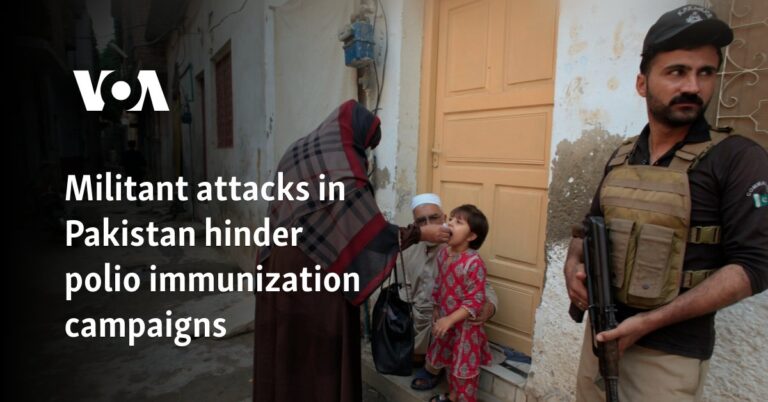Militants have stepped up attacks on polio vaccination teams and their police escorts amid a dramatic resurgence of polio cases in Pakistan.
Officials say the deteriorating security situation has prevented polio vaccination teams from reaching communities in high-risk areas where polio is endemic.
On Tuesday, militants attacked two health centers in the tribal districts of Orakzai and Waziristan that are being used in polio vaccination campaigns. Two police officers were killed in an attack in a rebel area along the Afghan border.
According to local officials in North Waziristan, militants snatched guns from police officers guarding polio teams and warned medical workers not to take part in the anti-polio campaign.
Reacting to the latest violence, Pakistan’s Interior Minister Mohsin Naqvi said in a statement: “The terrorist attack on the polio team is an attack on Pakistan’s secure future.”
The violence has raised safety concerns among those working on the front lines of the country’s polio response.
“When I participate, [a] “The polio vaccination team, we don’t know if we will be able to return home safely,” Fahima Bibi, a frontline polio worker overseeing vaccinations in northwestern Pakistan, told VOA.
But Bibi said she was determined to get the job done.
“The cause is bigger and requires greater commitment and sacrifice,” she told VOA.
Bibi’s safety concerns are shared by many of her colleagues.
According to Pakistan’s National Polio Eradication Emergency Operations Center, 225,440 female vaccinators are working in the immunization field, going door to door administering polio drops to children. They visit hard-to-reach, remote and conservative areas of Pakistan and break down cultural barriers.
Health Minister Ihtesham Ali of Pakistan’s northwestern Khyber Pakhtunkhwa province expressed concern on Wednesday over the spike in attacks. “The security situation in the southern districts of Khyber Pakhtunkhwa is very poor, and it is affecting access to the community, creating difficulties in accessing polio vaccination,” he told VOA. spoke.
“Horrifying environment”
Most of Pakistan’s recent infections have been reported in the southwestern province of Balochistan, which borders Afghanistan and Iran.
A World Health Organization official in the southern province of Balochistan said violence by armed groups was impacting polio control efforts in the province.
“Polio teams are going door to door in a scary environment,” said Dr. Nayyar Khan Loni, a WHO official in Balochistan. He said recent attacks in Balochistan have forced polio teams to urgently vaccinate children in some areas.
He said the vaccination campaign had been changed due to safety concerns. He said the recent polio outbreak in Balochistan was due to several factors, including cross-border movement with Afghanistan and misinformation among some parents about the polio vaccine. Ta.
Campaign for polio vaccine recipients
For nearly 15 years, Pakistan’s hardline militant group Tehreek-e-Taliban Pakistan (TTP) has waged a violent campaign against polio vaccinators and security forces protecting Pakistan’s polio team personnel. Extremists spread false claims that the polio vaccine was part of a Western plan to sterilize Muslim children. Extremists have also targeted polio teams suspected of being government spies.
In January, a major attack on polio teams and security personnel in northwestern Pakistan left at least five police officers dead and more than a dozen injured.
According to Khyber Pakhtunkhwa’s Emergency Operations Center, militants have carried out 23 attacks against polio teams and security personnel in Pakistan this year.
Overall, militant-sponsored violence has increased in Pakistan since the Taliban took over Afghanistan in 2021.
More than 1,000 Pakistanis were killed in extremist violence in the first 10 months of this year, half of them security forces, according to an independent think tank that tracks violence in Pakistan.
The Coalition to Defend Health in Conflict identified 16 cases of violence or obstruction of health care in Pakistan in 2022, up from seven cases in 2021. Almost 90% of these incidents involved intimidation or violence against polio vaccination workers, compromising the ability of health care providers. To meet vaccination targets.
Experts say the TTP ignores fatwas (edicts) from local and international religious scholars supporting polio vaccination in Pakistan.
Fakhar Hayat Kakaker, a Pakistan-based extremism researcher, said military operations have left militants with less space and given polio vaccination teams greater access to conflict areas.
“Since August 2021, the Pakistani Taliban have regrouped in the region and once they have secured ground, they have resumed their anti-polio vaccination campaign and now there is a sudden spike in polio cases,” he said.
Sindh health officials say the security situation in Sindh is not like that in Khyber Pakhtunkhwa, but police are providing security to polio teams in Karachi and other parts of the province.
“Police are patrolling the streets of Karachi to provide reassurance to the polio team. There are no security concerns. [the] The police are with us,” Shumaila Rasool, spokesperson for Sindh Emergency Operations Center, told VOA.
Afghanistan and Pakistan launched simultaneous polio vaccination campaigns on Monday. Pakistan and Afghanistan are the only countries in the world where the spread of polio has not been stopped.
VOA Deewa reporter Usman Khan contributed from Peshawar.

